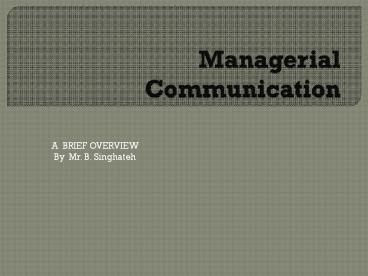Managerial Communication - PowerPoint PPT Presentation
Title:
Managerial Communication
Description:
A BRIEF OVERVIEW By Mr. B. Singhateh Isaac Singer (1904 - 1991) Polish-US novelist, short-story writer Our knowledge is a little island in a great ocean of non ... – PowerPoint PPT presentation
Number of Views:2151
Avg rating:3.0/5.0
Title: Managerial Communication
1
Managerial Communication
A BRIEF OVERVIEW By Mr. B. Singhateh
2
- Isaac Singer (1904 - 1991) Polish-US novelist,
short-story writer - Our knowledge is a little island in a great
ocean of non-knowledge.
3
- If you consider everyone as an island
- -we dont have extra sensory perception
- -We dont share knowledge or experiences as one
- -We are separate physical, spiritual and
emotional entities - then the question is
- How can we communicate better to be more
effective and increase our performance?
4
To start with
- What is Communication?
- Simply speaking, it is just 3 actions
- 1. giving or receiving information
- 2. co-creating ideas and plans
- 3. discovering and resolving points of conflict
5
Definition of Managerial Communication
- Managerial communication integrates communication
skills and knowledge of the entire system with
the function of the organization. (Level and
Galle, 1988) - Managerial communication is the process, normally
initiated by managers, of creating, exchanging
and interpreting messages, to achieve
organizational objectives. (Yusof Hussain, 1992)
6
Importance of Managerial Communication
- To show that managers use 85-90 of their time in
activities related to communication - To highlight the process of improving the
organizational climate for both formal and
informal communication among managers - To reveal that more managers are sent for extra
communication training to improve their
communication skills - To emphasize that oral communication skills is
used for managers promotion appraisal
7
The Nature of Managerial Communication
- a. Communication is the transfer and
understanding of meaning. 1. If no information
or ideas have been conveyed or transferred,
communication hasnt taken place. 2. For
communication to be successful, the meaning must
be imparted and understood.
8
- b. Good communication does not require agreement
with the message, just clear understanding of the
message. - c. Managerial communication encompasses both
interpersonal communication (between two or more
people) and organizational communication (all the
patterns, networks, and system of communication
within an organization). - d. Communication and associated interpersonal
processes are important ingredients of
organizational effectiveness. - E. Communication is the exchange of messages
between people for the purpose of achieving
common meanings. - F. Managers use two types of communication in
their work.
9
- 1. Verbal communication is the use of words to
communicate. - Written communication includes letters,
memoranda, reports, newsletters, policy manuals,
etc. - b. Disadvantage includes the fact that the
conversations may be time consuming and difficult
to terminate, and that additional time may have
to be spent to document what was said. - 2. Nonverbal communication is communication by
means of elements and behaviors that are not
coded into words. - 3. Nonverbal Communication is communication
transmitted without words. The best-known types
of nonverbal communication are body language and
verbal intonation. - Body language refers to gestures, facial
expressions, and other body movements that convey
meaning. - b. Verbal intonation refers to the emphasis
someone gives to words or phrases that convey
meaning.
10
Communication (when it works)
- Better mutual understanding
- Improved efficiency
- Increased innovation
- More shared learning
- Less frustration and stress
11
Communication Behaviors
- Appreciating the impact of our communication
behaviours - Thinking carefully about how we interact with
others - Taking the time to confirm meaning
- Speaking up with our thoughts and ideas
- Opening up to hear others perspectives
- Thinking sideways - not in silos about
opportunities to join up - Working with existing communication resources
- Slowing down to connect as a means of speeding
up - longer term efficiency
12
Good Communicator
- Approachable by all members of his organization
- Listens to what his/her colleagues and
subordinates have to tell him/her - Encourages his/her staff to tell him/her their
job-related problems and to give suggestions - Speaks the truth
- Gives satisfactory explanations and feedback
- Considers the feedback and suggestions of his/her
subordinates when making decisions
13
Bad Communicator
- Rude
- Talks down on others
- Does not listen well at others opinions
- Emotional
- Not prepared
- Telling lies
14
The End





![[READ] Managerial Accounting For Dummies PowerPoint PPT Presentation](https://s3.amazonaws.com/images.powershow.com/10087166.th0.jpg?_=20240727036)

























